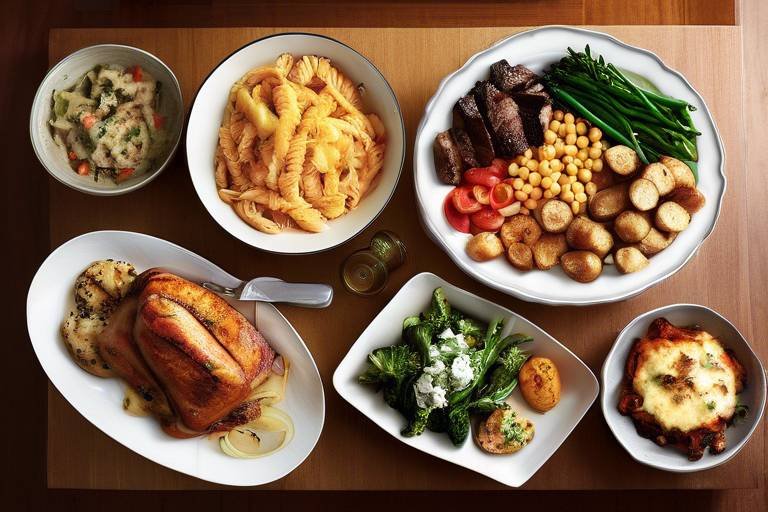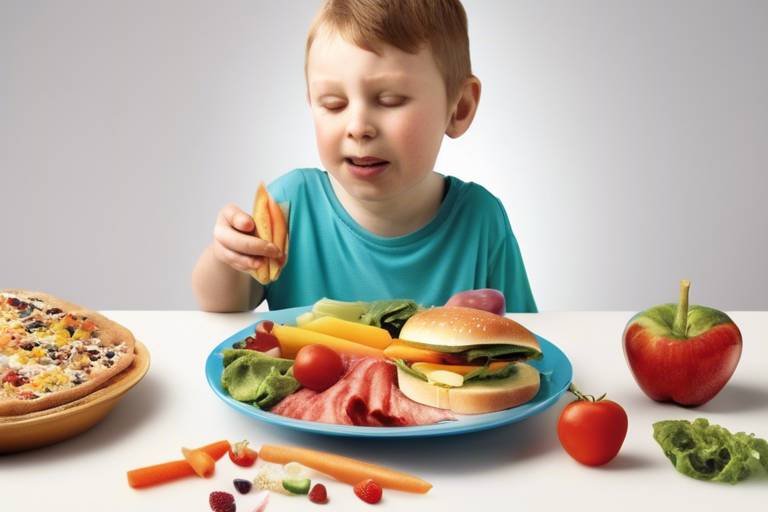The Nutritional Benefits of Family Dinners
Exploring the importance of family dinners, this article delves into their nutritional advantages, emotional connections, and how shared meals can enhance health and well-being for all family members. In today’s fast-paced world, where everyone seems to be rushing from one activity to the next, the simple act of gathering around the dinner table can feel like a breath of fresh air. Not only does it provide a chance to reconnect with loved ones, but it also serves as a golden opportunity to improve our nutritional intake. So, what exactly are the benefits of these shared meals? Let’s dive in!
Family dinners encourage healthier food choices, leading to better nutritional intake. When families come together to share meals, they naturally gravitate towards a wider variety of foods, which can significantly boost their intake of essential vitamins and minerals. Think about it: when you're sitting at the table with your loved ones, there's a greater chance of including colorful vegetables, whole grains, and lean proteins in your meal. You might even find yourself trying new dishes that you wouldn’t normally consider!
Research indicates that children who regularly eat with their families are more likely to consume fruits and vegetables, and less likely to indulge in sugary snacks and fast food. This shift not only benefits their physical health but also lays the groundwork for lifelong healthy eating habits. So, if you’ve been wondering how to get your kids to eat better, the answer might just be as simple as making family dinners a priority.
Sharing meals fosters communication and strengthens family relationships. The act of dining together creates an environment for connection and support, which is vital for emotional health. During family dinners, conversations flow like a river, allowing everyone to share their day, express their thoughts, and listen to one another. This exchange not only builds stronger bonds but also helps in developing a sense of belonging.
Family dinners provide opportunities to create cherished memories. Engaging in mealtime traditions can instill a sense of belonging and unity among family members. Whether it’s a special recipe passed down through generations or a silly theme night, these moments become the fabric of family history. Imagine the stories that will be told years down the line about the infamous spaghetti night or the taco Tuesdays that brought everyone together!
Special occasions often revolve around family meals, allowing families to celebrate milestones together. These gatherings reinforce family ties and create memorable experiences. From birthdays to anniversaries, each dinner serves as a reminder of the love and support that families share. The table becomes a canvas for laughter, joy, and sometimes even a few tears, as families come together to honor each other.
Establishing weekly themes for family dinners can add excitement and anticipation. This practice encourages creativity in meal preparation and makes dining together more enjoyable. For instance, you could have “Meatless Mondays” where everyone tries a new vegetarian dish or “Throwback Thursdays” where you revisit meals from your childhood. Not only does this keep the dinner routine fresh, but it also opens up discussions about food, culture, and family history.
Regular family dinners can instill healthy eating habits in children. By modeling balanced meal choices, parents can influence their children's long-term dietary preferences. When children see their parents enjoying a variety of foods, they are more likely to adopt similar habits. It's like planting seeds of health that will grow as they mature.
Family dinners can significantly impact mental health. Sharing meals provides a supportive atmosphere that can alleviate stress and promote open discussions about feelings and experiences. Imagine coming home after a long day and sitting down to a comforting meal surrounded by your loved ones. The warmth of those connections can act as a balm for the soul.
Engaging in regular family meals has been linked to lower rates of anxiety and depression. The social support gained during these times can enhance emotional resilience. Knowing that you have a safe space to share your thoughts and feelings can be incredibly empowering, especially for children and teenagers navigating the complexities of growing up.
Family dinners offer a platform for practicing communication skills. Children learn to express themselves and listen to others, fostering essential interpersonal skills for their future. The dinner table becomes a classroom where the lessons go beyond academics, teaching empathy, respect, and the art of conversation.
- How often should we have family dinners? Ideally, aim for at least three to four times a week to reap the most benefits.
- What if our schedules are too busy? Consider scheduling family dinners on weekends or setting specific nights that work for everyone.
- How can we make family dinners more engaging? Introduce themes, involve everyone in meal prep, or play games that encourage conversation.

Improved Nutritional Intake
Exploring the importance of family dinners, this article delves into their nutritional advantages, emotional connections, and how shared meals can enhance health and well-being for all family members.
Family dinners are not just about gathering around the table; they play a crucial role in promoting healthier food choices that can significantly enhance the nutritional intake of all family members. When families come together to share a meal, they often opt for home-cooked dishes that are rich in essential nutrients. This shared experience can lead to a wider variety of foods being consumed, which is vital for obtaining the necessary vitamins and minerals our bodies crave.
One of the most striking benefits of family dinners is the opportunity to introduce new ingredients and recipes. Imagine a typical weeknight dinner where everyone pitches in. One night, you might explore the vibrant world of vegetables by preparing a colorful stir-fry bursting with bell peppers, broccoli, and carrots. The next night could feature a hearty lentil soup, packed with protein and fiber. This variety not only keeps meals exciting but also ensures that family members are exposed to different food groups, promoting a more balanced diet.
Furthermore, the act of cooking together can be a fun and educational experience for children. As they help chop vegetables or stir the pot, they learn about the nutritional value of what they're eating. This hands-on experience fosters a sense of ownership over their food choices. Parents can teach their children about portion sizes, the importance of whole grains, and the benefits of incorporating fruits and vegetables into their meals. Over time, this knowledge can translate into healthier eating habits that last a lifetime.
Research has shown that families who regularly dine together tend to consume more fruits, vegetables, and whole grains compared to those who eat separately. A study found that children who participate in family meals are more likely to eat a balanced diet and less likely to engage in unhealthy eating behaviors such as snacking on junk food. This is particularly important in today's fast-paced world, where convenience often trumps nutrition.
To illustrate the impact of family dinners on nutritional intake, consider the following table:
| Food Group | Family Meals | Individual Meals |
|---|---|---|
| Fruits and Vegetables | Increased consumption | Lower consumption |
| Whole Grains | Higher intake | Lower intake |
| Processed Foods | Reduced intake | Higher intake |
As you can see, the nutritional benefits of family dinners are profound. By making a conscious effort to gather around the table, families can cultivate a culture of healthy eating that not only nourishes the body but also enhances the overall well-being of each member. So, why not make it a priority? Set aside time each week for family dinners, and watch as your family's health flourishes!
Sharing meals fosters communication and strengthens family relationships. The act of dining together creates an environment for connection and support, which is vital for emotional health.
Family dinners provide opportunities to create cherished memories. Engaging in mealtime traditions can instill a sense of belonging and unity among family members.
Special occasions often revolve around family meals, allowing families to celebrate milestones together. These gatherings reinforce family ties and create memorable experiences.
Establishing weekly themes for family dinners can add excitement and anticipation. This practice encourages creativity in meal preparation and makes dining together more enjoyable.
Regular family dinners can instill healthy eating habits in children. By modeling balanced meal choices, parents can influence their children's long-term dietary preferences.
Family dinners can significantly impact mental health. Sharing meals provides a supportive atmosphere that can alleviate stress and promote open discussions about feelings and experiences.
Engaging in regular family meals has been linked to lower rates of anxiety and depression. The social support gained during these times can enhance emotional resilience.
Family dinners offer a platform for practicing communication skills. Children learn to express themselves and listen to others, fostering essential interpersonal skills for their future.
- How often should families have dinner together?
While there's no set rule, aiming for at least three to four times a week can be beneficial. - What if my family has different dietary preferences?
Consider making meals that can be easily customized to accommodate different tastes and dietary needs. - Can family dinners really improve health?
Absolutely! Regular family meals are associated with better nutritional intake and improved mental health.

Enhanced Family Bonds
When it comes to nurturing relationships within a family, sharing meals is one of the most effective ways to foster bonds that last a lifetime. Imagine sitting around a table, the aroma of delicious food wafting through the air, laughter echoing, and stories being exchanged. This simple act of dining together creates an environment where family members feel connected and supported. It's not just about the food; it's about the experience of being together, which is vital for emotional health.
During family dinners, conversations flow freely, allowing everyone to share their thoughts, experiences, and feelings. This open dialogue is crucial for building trust and understanding among family members. Children learn to articulate their ideas and listen to others, which enhances their communication skills. Moreover, these gatherings often lead to spontaneous discussions about daily events, school, or even dreams and aspirations, making everyone feel valued and heard.
Moreover, the rituals surrounding family dinners can strengthen these bonds even further. Whether it's a special recipe passed down through generations or a fun tradition like Taco Tuesdays, these practices create a sense of belonging and unity. Families can even create their own unique rituals, such as sharing a highlight of the day before digging into their meal. This not only enhances the dining experience but also reinforces the emotional connections that are so important.
In addition to daily meals, family dinners provide an excellent opportunity to celebrate milestones and special occasions. Birthdays, anniversaries, or even a successful week can be commemorated with a special meal, creating lasting memories that family members will cherish for years to come. These gatherings are more than just a meal; they are a chance to reflect on achievements and support one another through life's ups and downs.
To make family dinners even more engaging, consider establishing a weekly theme. Themes can range from international cuisine nights to favorite childhood dishes. This not only adds excitement and anticipation to the dining experience but also encourages everyone to participate in meal preparation, fostering teamwork and creativity. Imagine the joy of cooking a new dish together, laughing over mishaps, and enjoying the fruits of your labor as a family!
Ultimately, the act of sharing meals creates a strong foundation for family bonds. By prioritizing family dinners, you are investing in the emotional well-being of each member. The connections formed around the dinner table can lead to a more cohesive and supportive family unit, where everyone feels loved and valued. So, why not gather your loved ones tonight and experience the magic of a shared meal?
- Why are family dinners important? Family dinners are crucial for strengthening relationships, improving communication, and enhancing emotional well-being among family members.
- How often should families have dinner together? Ideally, families should aim to have dinner together at least a few times a week to reap the full benefits of shared meals.
- What are some easy meal ideas for family dinners? Simple meals like spaghetti, tacos, or stir-fried vegetables can be quick to prepare and are usually crowd-pleasers.
- How can I encourage my family to participate in dinner preparations? Involve them in planning the menu, shopping for ingredients, or cooking together to make it a fun and collaborative effort.

Creating Lasting Memories
Family dinners are not just about the food; they are about creating an atmosphere where lasting memories can flourish. Imagine sitting around a table, the aroma of a delicious meal wafting through the air, laughter filling the room, and stories being shared. These moments are the fabric of family life, weaving together experiences that will be cherished for years to come. From the simple act of passing the mashed potatoes to the deep conversations about dreams and aspirations, every dinner is an opportunity to create a memory that can be revisited with a smile.
One of the most beautiful aspects of family dinners is the traditions that develop over time. Whether it’s a special recipe passed down through generations or a quirky habit like telling jokes before the meal, these rituals become touchstones in our family history. They offer a sense of continuity and belonging, reminding us of our roots and the love that binds us together. For instance, you might have a taco night every Tuesday, where everyone contributes an ingredient. This not only makes the meal more interesting but also gives each family member a sense of ownership and pride in the family tradition.
Moreover, family dinners provide a unique opportunity for storytelling. As the food is served, so are the tales of the past—anecdotes about the family’s history, funny incidents, or even lessons learned. These stories enrich our lives and help younger members of the family understand their heritage. Think about it: when was the last time you heard a story about your grandparents or your parents’ childhood? These narratives can spark curiosity and interest in family history, making children feel connected to something larger than themselves.
Additionally, these shared meals can also serve as a platform for celebrating achievements and milestones. Whether it’s a birthday, a graduation, or simply a promotion at work, family dinners allow everyone to come together and celebrate. The joy of sharing good news in the company of loved ones amplifies the happiness and creates a positive memory that is etched in everyone’s mind. Celebrating together not only strengthens family bonds but also reinforces the idea that we are there for each other through thick and thin.
In conclusion, the act of gathering around the dinner table does more than just nourish our bodies; it nourishes our souls. By creating lasting memories through shared meals, we cultivate a sense of belonging and unity that is essential for a healthy family dynamic. So, the next time you sit down for dinner, take a moment to appreciate the memories being made. After all, in the grand tapestry of life, it’s these moments that truly matter.
- Why are family dinners important? Family dinners are important because they foster communication, strengthen relationships, and promote healthier eating habits.
- How can I encourage my family to have dinner together? Start by setting a regular dinner time, involving everyone in meal planning, and making the dining experience enjoyable.
- What are some ideas for family dinner themes? You can have themes like Taco Tuesdays, Pasta Nights, or even International Cuisine nights where each week you explore a different culture's food.
- How do family dinners affect children's behavior? Regular family meals have been linked to better behavior in children, as they provide a supportive environment for communication and emotional growth.

Celebrating Special Occasions
When it comes to celebrating special occasions, family dinners take center stage, transforming ordinary meals into extraordinary gatherings. Whether it’s a birthday, anniversary, or holiday, these moments are perfect for bringing everyone together around the table. There’s something magical about sharing a meal that marks a significant event in our lives. It’s not just about the food; it’s about the connections we forge and the memories we create.
Imagine the aroma of a delicious feast wafting through the house, the laughter of loved ones filling the air, and the joy of reminiscing about past celebrations. These dinners often become the highlight of our calendars, where we gather to honor milestones and achievements. Celebrating special occasions with family dinners allows us to pause, reflect, and appreciate the journey we’ve taken together. It’s a time to share stories, exchange gifts, and, most importantly, celebrate the love that binds us.
Moreover, these gatherings can be a wonderful opportunity to introduce family traditions that can be passed down through generations. For instance, you might decide to have a specific dish that is always served during your family’s holiday celebrations. This not only adds a layer of nostalgia but also strengthens family identity and unity. Traditions, like a special dessert or a unique way of decorating the table, can make your family dinners even more memorable. They become rituals that everyone looks forward to, creating a sense of belonging and continuity.
In addition to personal milestones, family dinners during holidays can serve as a platform for gratitude. It’s a chance to express appreciation for one another, highlighting the importance of family support. During these occasions, you can take a moment to share what you’re thankful for, reinforcing emotional bonds. This practice not only enriches the experience but also nurtures a positive atmosphere that can uplift everyone’s spirits.
To make these celebrations even more special, consider incorporating a few creative elements:
- Themed Decorations: Transform your dining space with decorations that match the occasion. Whether it’s balloons for a birthday or candles for a romantic anniversary dinner, a little effort goes a long way.
- Personalized Place Settings: Create unique place cards for each family member, adding a personal touch that shows you care.
- Memory Sharing: Encourage everyone to share their favorite memories related to the occasion. This can spark laughter, joy, and sometimes even tears, deepening connections.
Ultimately, celebrating special occasions through family dinners is about more than just the food; it’s about the moments we share, the laughter we create, and the love that fills the room. As we gather around the table, we weave a tapestry of experiences that enrich our lives and strengthen our family bonds. So, the next time you have something to celebrate, remember that a family dinner can turn a simple meal into a heartfelt celebration that everyone will cherish.
Q: Why are family dinners important for special occasions?
A: Family dinners during special occasions foster connection, create lasting memories, and provide a platform for expressing gratitude and love.
Q: How can I make family dinners more special?
A: Incorporate themed decorations, personalized place settings, and encourage memory sharing to enhance the experience.
Q: What types of meals are best for family celebrations?
A: Meals that cater to various tastes and dietary needs work best. Consider traditional dishes that hold significance for your family, along with some new recipes to keep things exciting!

Weekly Family Themes
Establishing weekly themes for family dinners can transform an ordinary meal into an exciting event that everyone looks forward to. Imagine the anticipation of a Mexican Night where tacos, enchiladas, and guacamole take center stage one week, followed by a cozy Italian Night filled with pasta and garlic bread the next. This practice not only adds variety to your meals but also encourages creativity in the kitchen, allowing family members to contribute their ideas and preferences. It's like a culinary adventure that everyone can embark on together!
When you designate a theme for each week, it opens up opportunities for exploration and learning. For instance, a World Cuisine Night might inspire families to research different cultures, trying out recipes from various countries. This not only enriches the dining experience but also fosters a sense of global awareness and appreciation for diversity. Plus, it can lead to some fun discussions about the origins of the dishes being served!
To keep things organized and to ensure everyone gets involved, you might consider creating a simple
| Week | Theme | Dish Ideas |
|---|---|---|
| 1 | Mexican Night | Tacos, Quesadillas, Salsa |
| 2 | Italian Night | Pasta, Pizza, Tiramisu |
| 3 | Asian Night | Sushi, Stir-fry, Dumplings |
| 4 | American BBQ | Burgers, Hot Dogs, Corn on the Cob |
This table not only serves as a guide but also gets everyone involved in meal planning. Each week, a different family member can take the lead on preparing the meal, making it a fun and collaborative effort. Who doesn’t love a little friendly competition in the kitchen? You could even have a voting system where everyone rates the meals, adding a playful twist to your dining experience!
Ultimately, the key to successful weekly themes is to keep it light-hearted and enjoyable. The goal is to create an environment where everyone feels comfortable sharing their thoughts and ideas. So, why not spice up your family dinners with a little imagination? You might be surprised at how much fun you can have while also nourishing your bodies and strengthening your bonds!
- How can I encourage my family to participate in weekly themes?
Start by discussing the idea during a family meeting. Allow everyone to suggest themes and dishes they’d like to try. This involvement makes them more excited about participating! - What if someone in my family has dietary restrictions?
Be mindful of everyone’s needs. You can modify dishes to accommodate dietary restrictions while still sticking to the theme. For example, using gluten-free pasta for Italian Night. - Can we have themes that are not based on cuisine?
Absolutely! Themes can be based on colors, holidays, or even favorite movies. The sky's the limit when it comes to creativity!

Encouraging Healthy Eating Habits
When it comes to instilling healthy eating habits in children, family dinners play a pivotal role. Picture this: a bustling kitchen filled with laughter, the aroma of freshly cooked meals wafting through the air, and family members gathered around the table. This setting not only creates a warm atmosphere but also serves as a prime opportunity for parents to model balanced meal choices. Research shows that children who regularly participate in family meals are more likely to embrace a variety of foods and develop a positive relationship with nutrition.
One of the most effective ways to encourage healthy eating is through involvement. When children are involved in meal planning and preparation, they feel a sense of ownership over what they eat. This can be as simple as letting them choose a vegetable for dinner or assisting in cooking. Engaging them in the process can spark their interest in trying new foods. For instance, if a child helps prepare a colorful salad, they are more likely to taste it. Involving kids in the kitchen also opens up discussions about nutrition, allowing parents to explain the benefits of different ingredients.
Moreover, family dinners provide an excellent platform for introducing variety. By rotating through different cuisines or themes each week, families can explore a range of flavors and ingredients. This not only keeps meals exciting but also expands children’s palates. For example, one week could be dedicated to Italian cuisine, featuring dishes like whole wheat pasta with vegetables, while another week could focus on Mexican food, showcasing black bean tacos with fresh salsa. This kind of diversity in meals helps children understand that healthy eating can be both enjoyable and adventurous.
It's also essential to create a positive mealtime environment. This means minimizing distractions, such as electronic devices, and fostering an atmosphere where everyone feels comfortable sharing their thoughts and experiences. During dinner, parents can encourage children to discuss their day, share stories, or even talk about their favorite foods. This not only strengthens family bonds but also reinforces the idea that mealtime is a time for connection and nourishment.
In addition to fostering healthy eating habits, regular family dinners can also help children develop a more mindful approach to food. When families take the time to sit down and enjoy their meals together, they naturally slow down and savor each bite. This practice can lead to better digestion and a greater appreciation for the food on their plates. It’s a simple yet effective way to teach children about the importance of listening to their bodies and recognizing when they are full.
Ultimately, the impact of family dinners on children's eating habits can be profound. By creating a routine that emphasizes healthy choices, involvement, variety, and mindfulness, families can pave the way for a lifetime of nutritious eating. So, the next time you gather around the dinner table, remember that you’re not just sharing a meal; you’re building a foundation for a healthier future.
- How often should families have dinner together?
While there is no strict rule, aiming for at least three to four family dinners a week can significantly enhance the benefits discussed. - What if my child is a picky eater?
Involve them in meal planning and preparation, and encourage them to try new foods without pressure. - Can family dinners improve academic performance?
Yes, studies suggest that children who regularly eat with their families tend to perform better academically due to improved communication skills and emotional support. - What are some healthy meal ideas for family dinners?
Consider grilled chicken with quinoa and steamed vegetables, homemade pizza with whole grain crust and plenty of toppings, or stir-fried tofu with a variety of colorful veggies.

Improved Mental Health
Family dinners can significantly impact mental health, acting as a powerful antidote to the stresses of daily life. Imagine coming home after a long day, feeling the weight of the world on your shoulders, and being greeted by the aroma of a home-cooked meal. This simple act of sharing food can transform your mood and create a sense of belonging. When families gather around the dinner table, they create a supportive atmosphere that fosters open discussions about feelings, experiences, and daily challenges. It's during these moments that family members can connect on a deeper level, sharing not just food, but also their thoughts and emotions.
Moreover, the social support gained from these shared meals is invaluable. Studies have shown that regular family dinners are linked to lower rates of anxiety and depression. The act of eating together provides a safe space where family members can express themselves without judgment. This environment encourages everyone to share their highs and lows, creating a sense of solidarity that can enhance emotional resilience. For children, these dinners are particularly crucial, as they learn to articulate their feelings and listen to others, skills that are essential for their future interactions.
It's fascinating to consider how something as simple as a meal can play such a pivotal role in mental well-being. Think of family dinners as a mental health booster. They serve as a regular check-in point where everyone can gauge how they are feeling and offer support to one another. This routine not only strengthens relationships but also helps in developing communication skills. Children, for example, learn to express their thoughts and feelings, which is a vital part of emotional intelligence.
To illustrate the benefits of family dinners on mental health, consider the following table:
| Benefit | Description |
|---|---|
| Reduced Anxiety | Regular family meals create a comforting routine, helping to alleviate feelings of anxiety. |
| Lower Depression Rates | Social support during meals can enhance emotional resilience, reducing the risk of depression. |
| Improved Communication | Family dinners provide a platform for practicing and improving communication skills. |
In essence, family dinners are more than just a time to eat; they are a crucial part of maintaining mental health for all family members. They create a nurturing environment where individuals feel valued and heard. So, the next time you sit down for a meal with your loved ones, remember that you are not just nourishing your bodies but also your minds and hearts.
- How often should families have dinner together? Ideally, families should aim for at least three to four dinners together each week to maximize the emotional and nutritional benefits.
- What types of meals are best for family dinners? Meals that incorporate a variety of food groups, including fruits, vegetables, whole grains, and lean proteins, are ideal for promoting good health.
- Can family dinners help with children's social skills? Absolutely! Regular family meals can enhance children's communication skills and help them learn to express their thoughts and feelings more effectively.

Reducing Anxiety and Depression
Family dinners are more than just a time to enjoy a meal; they are a vital lifeline for emotional well-being. In today's fast-paced world, anxiety and depression can feel like unwelcome guests that refuse to leave. However, the simple act of gathering around the dinner table can significantly help in reducing these feelings. How? Well, when families come together to share a meal, they create a supportive atmosphere that fosters connection and understanding. This environment allows family members to express their thoughts and feelings openly, which is crucial for mental health.
Research has shown that regular family meals are linked to lower rates of anxiety and depression among children and adolescents. It’s like having a safety net; when kids know they can rely on their family for support, they feel less isolated in their struggles. During these dinners, family members can discuss their day, share their worries, or simply laugh together. This interaction not only strengthens relationships but also enhances emotional resilience. Think of it as a warm hug for the soul—a moment where everyone feels seen, heard, and valued.
Moreover, the routine of family dinners can instill a sense of stability in children's lives. When they know that every Tuesday night is dedicated to family time, it creates an anchor in their week. This predictability can alleviate feelings of uncertainty and anxiety. In this safe space, children can practice communication skills, learning how to articulate their feelings and listen to others. It's a win-win situation where everyone grows together.
To illustrate the impact of family dinners on mental health, consider the following table that outlines some of the benefits:
| Benefit | Description |
|---|---|
| Emotional Support | Family members can share their feelings, reducing feelings of isolation. |
| Communication Skills | Regular discussions help children learn to express themselves effectively. |
| Routine and Stability | Predictable family dinners provide a sense of security for children. |
| Shared Laughter | Humor during meals can lighten the mood and reduce stress levels. |
In essence, family dinners are not just about the food on the table but about the connections we forge and the support we provide each other. They are a powerful antidote to the challenges of anxiety and depression, creating a nurturing environment where everyone can thrive. So, why not make it a point to gather around the table more often? Your mental health might just thank you for it!
- How often should families have dinner together? Ideally, aim for at least a few times a week to foster connection.
- What if my family has different schedules? Try to find a common time that works for everyone, even if it’s just once a week.
- Can family dinners really improve mental health? Yes! They provide emotional support and a platform for open communication.
- What if we don’t have time to cook? Consider simple meals or even takeout; the important part is gathering together.

Building Communication Skills
Family dinners are more than just a time to enjoy delicious food; they are a goldmine for developing communication skills. When families gather around the table, they create a unique environment where everyone gets a chance to speak, listen, and engage with one another. Imagine this: a lively dinner table filled with laughter and stories, where each family member shares their day. This simple act of sharing not only strengthens relationships but also enhances verbal communication skills that are essential for personal and professional success.
During these shared meals, children observe how adults communicate. They learn the nuances of conversation, such as taking turns, maintaining eye contact, and using appropriate body language. It's like watching a live theatre performance where every actor plays a vital role in the unfolding story. For instance, when a parent asks about their child's day, it encourages the child to articulate their thoughts and feelings. This back-and-forth dialogue fosters not just speaking skills but also active listening—a critical component of effective communication.
Furthermore, family dinners provide a safe space for children to express themselves. They can share their thoughts or concerns without the fear of judgment. This practice builds their confidence to communicate openly in other settings, like school or social gatherings. In fact, studies have shown that children who regularly engage in family meals tend to develop better interpersonal skills and are more adept at handling social situations.
To illustrate this point, consider the following table that highlights the key communication skills developed during family dinners:
| Communication Skill | Description |
|---|---|
| Active Listening | Paying attention to what others are saying and responding appropriately. |
| Expressive Language | Using words effectively to convey thoughts and emotions. |
| Nonverbal Communication | Understanding body language and facial expressions. |
| Conflict Resolution | Learning to address disagreements in a constructive manner. |
In addition to these skills, family dinners also encourage the development of empathy. When family members share personal stories or challenges, it allows others to step into their shoes, fostering a deeper understanding of different perspectives. This exchange not only enhances emotional intelligence but also helps children learn the importance of kindness and compassion in their interactions with others.
So, the next time you sit down for a family meal, remember that it's not just about the food on your plate. It's a rich opportunity to cultivate vital communication skills that will serve your children well throughout their lives. By making family dinners a regular occurrence, you're not only nourishing their bodies but also their ability to connect with others meaningfully.
- How often should families have dinner together? Ideally, aim for at least three to five times a week to reap the benefits.
- What if my family has busy schedules? Consider setting a specific day or time each week dedicated to family dinners, making it a priority.
- Can family dinners improve academic performance? Yes, studies suggest that children who regularly dine with their families tend to perform better academically.
- What are some conversation starters for family dinners? Ask about each person's favorite part of the day, or discuss a book or movie everyone has seen recently.
Frequently Asked Questions
- What are the nutritional benefits of family dinners?
Family dinners encourage healthier food choices and increase the variety of foods consumed. This leads to better nutritional intake, ensuring that everyone gets essential vitamins and minerals that are crucial for overall health.
- How do family dinners enhance emotional connections?
Sharing meals creates a warm environment for communication and support, which strengthens family relationships. The act of dining together fosters a sense of belonging and nurtures emotional health among family members.
- Can family dinners help in creating lasting memories?
Absolutely! Family dinners provide opportunities to engage in mealtime traditions that instill a sense of unity. These shared experiences become cherished memories that families can look back on fondly.
- How can we celebrate special occasions with family dinners?
Special occasions often revolve around meals shared with family. Celebrating milestones together during these gatherings reinforces family ties and creates memorable experiences that everyone can treasure.
- What are weekly family dinner themes?
Establishing weekly themes for family dinners can add excitement and creativity to meal preparation. It encourages everyone to participate and makes dining together more enjoyable, turning an ordinary meal into a fun event!
- How do family dinners instill healthy eating habits in children?
By regularly sharing balanced meals, parents can model healthy eating habits for their children. This practice influences children's long-term dietary preferences, making them more likely to choose nutritious options as they grow.
- What impact do family dinners have on mental health?
Family dinners significantly impact mental health by providing a supportive atmosphere that alleviates stress. They promote open discussions about feelings and experiences, which can be therapeutic for all family members.
- Can family dinners reduce anxiety and depression?
Yes! Regular family meals are linked to lower rates of anxiety and depression. The social support gained during these times enhances emotional resilience, helping everyone feel more secure and connected.
- How do family dinners help build communication skills?
Family dinners offer a platform where children can practice expressing themselves and listening to others. This fosters essential interpersonal skills that are vital for their future interactions both personally and professionally.



















